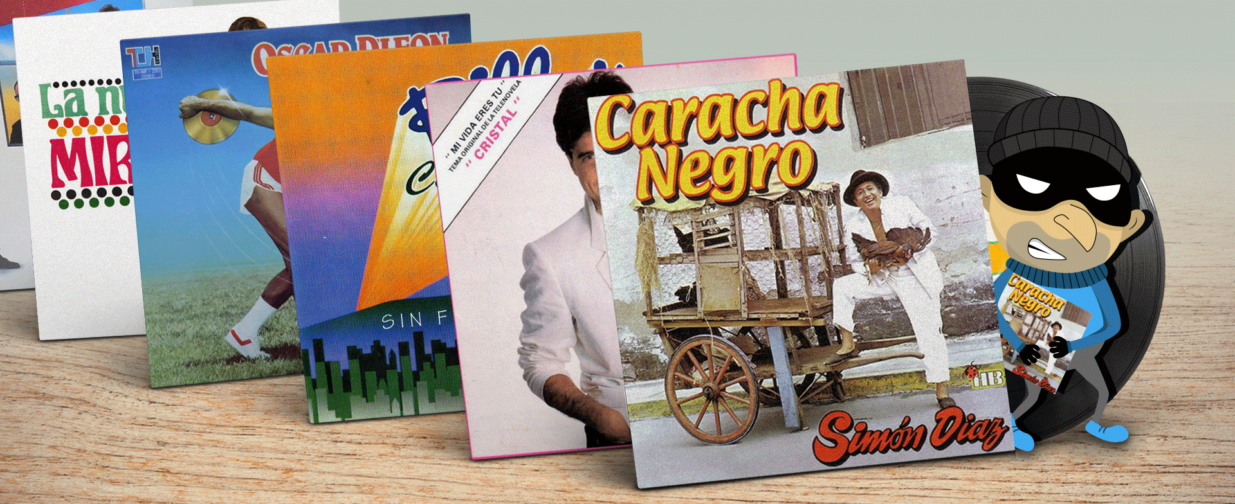
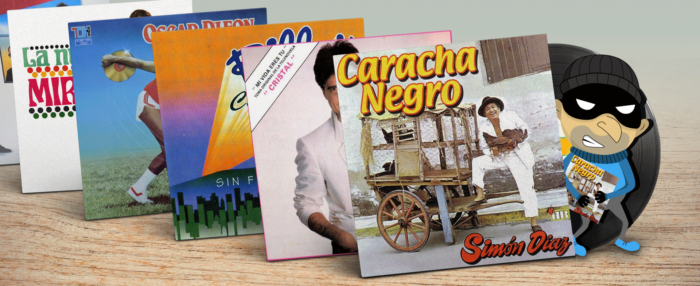
Mundo Digital USA, a company created in Florida, and related to another company based in Madrid, is using almost all the Venezuelan musical heritage after a suspicious and unclear operation. This is a situation derived from the paradigm change of consumption of songs and a certain indifference on behalf of the main record labels and those in charge of their labels, who failed to notice ahead of time the changes bequeathed by technology. The affected - singers, composers - remain the usual victims. The money they should receive for their creations arrives incomplete and sometimes it never does at all.
|
Getting your Trinity Audio player ready...
|
It's called Mundo Digital USA. It has taken over much of the catalogs of the Venezuelan record labels Sonografica, Velvet, El Palacio de la Musica and the ones that disappeared like Sonorodven, who had in their portfolios the best singers of the local scene of the Eighties, and distributes through online stores, against the will of their heirs, the songs of Simon Diaz, the most emblematic of the folklorists. The story is a sum of carelessness, mistakes and, to say of those affected, a blatant robbery of the collection of pop created in Venezuela three decades ago.
Those affected say that 70 percent of the collection of Venezuelan music is in the hands of impostors. That is, about 1,500 albums are available to Mundo Digital USA. If each one contains 10 songs, it reaches a figure of 15,000 pieces. If each one, which costs almost a dollar, is downloaded ten times, it would be about $150,000 per month that are in the hands other than its real owners. The figure is a twist in the eternal conflict between producing houses and artists. Composers and singers are even more unprotected because they are not getting anything for their creations. And how was it possible that the catalogs changed hands without their original owners knowing?
In these lines lies a possible explanation:
It is perhaps the most horrible story. The musical wing of Grupo 1BC, owner of the late television station Radio Caracas Television and of the radio station 92.9 FM, both closed by the Chavez regime, took many years to understand that the digital format was the future of the business. Compact discs and vinyls are sold less each month because music, whether pirated or not, is within reach of iTunes, Spotify, Amazon, Deezer or Pandora.
In April 2016 the entire catalog of Sonografica, about 4,400 titles and more than 100 artists, was available for the first time online
It took Sonografica a year to recover its entire catalog and the covers of those records. In some cases they redesigned the covers. They also hired foreign individuals and companies who digitized their products and loaded them onto a special platform. In all that time they talked to The Ochard, one of the main distributors or music aggregators and digital content in the world. On April 29, 2016, the entire catalog of Sonografica, about 4,400 titles and more than 100 artists, was available for the first time online, anywhere in the world where the internet allowed to click play to a song and buy it for $0.99 or buy the entire album for $10.
It was not anything. It was all the titles of its archives, from the catalog inherited from the company Polydor de Venezuela (created in the 60's of the last century) - with which Sonografica was born in 1982 - plus everything produced during the 1980s, when a decree by the then-President Luis Herrera Campins, known as "one for one", made it compulsory for radio stations to broadcast a theme by a national artist for each international artist who was played in their programs.
The drive it gave to the national record industry and Venezuelan artists was unprecedented. Sonografica became the main rival of Sonorodven, also born in the 80’s, which belonged to the Grupo Cisneros, owners of the TV channel Venevision. The compulsory "one for one" witnessed the emergence of talents such as Ricardo Montaner, Karina, Melissa, Yordano, Ilan Chester, Franco De Vita, Rudy La Scala, Colina, Guillermo Davila and others who joined the music scene where already important voices resonated.
The joy of being in the top online stores was short lived. Twelve days after that April 29, 2016, Sonografica began to see its duplicate catalog in every online store. Not only were the titles repeated (some identified with the copyright of Sonografica and others with the copyright of the company Mundo Digital USA), but names of albums copied on different covers, compilations never made by this record label and supposed new albums that mixed themes of rival record labels.
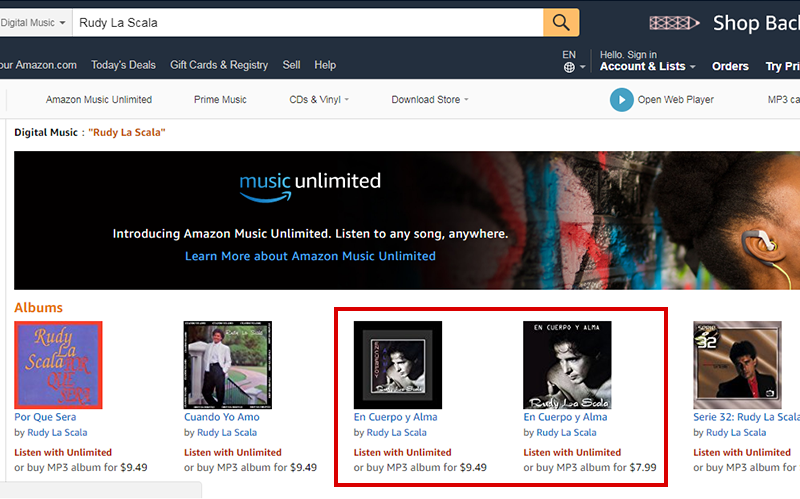
It happened, for example, with the "The Halley Generation" record plate, the soundtrack of the film by the same name directed by Thaelman Urguelles, success of Sonorodven in the 80’s that was versioned by Mundo Digital USA under the name of "The Halley Degeneration", mixing songs by Sonorodven and Sonografica. All a nonsense that ignores the disputes that the companies had at the time. "We could never reach an agreement to make a record together, and these people have done it," says Luisa Elena Flores, in charge of the digital management of the Sonografica catalog.
They also placed in the digital stores the first two albums sung in English by Rudy La Scala when he arrived in Venezuela. Only the artist knew that they existed because it never became part of the catalog of Polydor acquired by Sonografica, and they did the same with two albums of Kiko Botones, a character incarnated by the Mexican Carlos Villagran, member of the cast of El chavo del 8, when the artist recorded a series in Radio Caracas Television.
"That person seems like he was waiting for Sonografica to leave for him to come out..."
The finding of the copied titles makes the Sonografica team think that behind Mundo Digital USA there is a collector and knower of the Venezuelan record industry, because they have titles as unknown as valuable, including record plates that were believed to be lost because in the process of digitalization of the content the master tape of the recording was never found. "That person was waiting for Sonografica to leave for him to come out, so that he would be like the curtain that would cover the rest of the catalogs. It’s not only mine, there are many. Virtually 70% of the Venezuelan catalog has been uploaded by them", says Sonografica's representative.
Upon hearing the complaint, The Orchard connected Sonografica with the distributor who sent them the catalog attributed to Mundo Digital. From there onward the mailings and calls began, which resulted in nothing. Not even the value of copyright has been considered 16 months later.
Some singers and composers began to realize almost by chance. Among them is Rudy La Scala, who has not changed record label in spite of living in Los Angeles, and today appears as the artist that generates more profits for Sonografica. But others are not aware. There are more than 100 artists and contracts dating back to the Polydor era, so there is easily more than one who ignores it. In this other group is Oscar de Jesus Colina, the irreverent singer of the 80’s that established a milestone in musical aesthetics and video clips, and embraced success in that decade to then hit rock bottom.
"I'm learning this thanks to you, from this call," he answers on the other side of the phone. “I know Amazon sells several of my songs, I thought Sonografica was doing it. I knew nothing of this. I have not received anything from Amazon either.”
It is not difficult to find the name of Mundo Digital USA in Amazon and other online stores, each album includes data from the company that edited the product, including one important detail: copyright. The copyright indicates the year of the first publication and the name of the producer or owner of that recording. While the original titles of Sonografica are published with the copyright "Distribuidora Sonografica", and the year in which it was effectively released for the first time (between the 80’s and 90’s), the titles copied by Mundo Digital are copyright 2016 or 2017.
You would have to be Venezuelan to detect that anomaly in the years of recording an album that turned out to be a hit in the 80's or to be curious and check the credits of the plate. Almost no one cares what the C of copyright means and if the record you are listening to is an illegal copy.
In a routine search on Spotify and iTunes, in mid-2016, Bettsimar Diaz, heiress of the musical heritage of Simon Diaz, found several albums owned by the family with those details. The record label of Simon Diaz used to be El Palacio de la Musica, but between 1994 and 2008 the remembered Uncle Simon began to record and produce without a record label as intermediary. Bettsimar found in one of those platforms one of the independent recordings.
For the recordings to get there, there were only two options: that Bettsimar herself, as legal representative, made a negotiation with an aggregating company or distributor like The Orchard, a possibility she denies because it has not happened, or they copied it. She does not doubt the second option because she knows that some of these albums produced without the support of the great record labels have been uploaded on YouTube by spontaneous people. From there they can take the audio to upload the songs or the complete record. This is how the production "Hand in hand with children", from the catalog 1994-2008, with Copyright 2017 from Mundo Digital USA, may have reached iTunes. The name is repeated.
The titles that are property of El Palacio de la Musica have also been copied. The first album of Simon Diaz with this record label, recorded between 1963 and 1964, is sold as property of Mundo Digital USA and at the same time with the seal of his initial record label; legal and pirate in the same platforms.
"I don’t want to know how many have been plagiarized. I don’t want to imagine how much we have stopped receiving because if not, I wont sleep anymore"
El Palacio de la Musica was the record label that distributed Fania All Star throughout Latin America. Not any more; this catalog was sold, and the company has remained as the main representative of Venezuelan folklore and other genres, with Simon Diaz, Serenata Guayanesa, Hugo Blanco and Cheo Feliciano as the sales leaders of its catalog.
All of their titles were traded with The Orchard in 2009 and since then it can be purchased at major online stores. Ernesto Aue, president of El Palacio de la Musica, remembers that at that time they had to send to the transnational all the documents that proved the ownership of the company on all the recordings that they negotiated. Although at that time its entire catalog traveled in physical, without risk of some digital filtration, it did not save them from its titles being copied. "I don’t want to know how many have been plagiarized. I don’t want to imagine how much we have stopped receiving because if not, I won’t sleep anymore", he says. "Technology ended our business," he adds, with evident nostalgia.
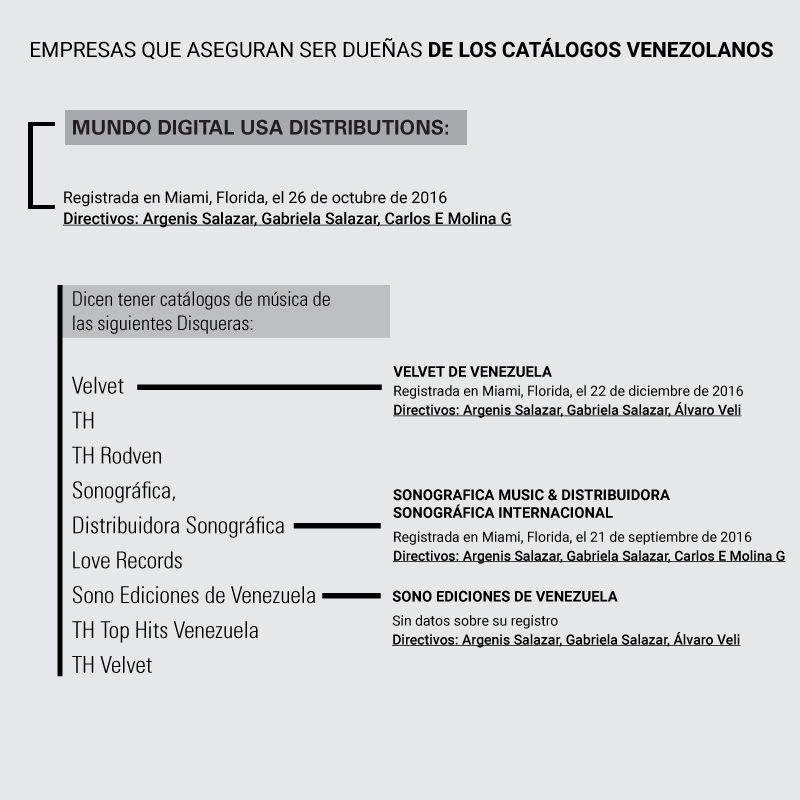
Bettsimar Diaz's claim had two answers: Spotify stopped selling the questioned material, but iTunes did not. The latter company has the policy to bring the parties together to reach an agreement. If it is verified that the title denounced is an illegal copy they remove it from their listing. Perhaps because they are aware of this situation, the representatives of Mundo Digital USA stopped responding to Bettsimar and referred her to a lawyer. While the dispute is not resolved, iTunes continues to offer the questioned titles without caring if they are duplicates.
For Palacio de la Musica it was not different. Since they detected the first irregular sales more than three years ago they tried to locate the people behind those companies, but it was useless. The Orchard also did not facilitate the search, nor have the alleged stolen titles been disincorporated from their offer. For Aue, this transnational escapes from the legal conflict.
With the death of Jose Page, owner of the label Velvet de Venezuela, in April 2016, his sons inherited the business. When they began to see the status in which the family business was, they realized that their catalog - considerable from everything achieved since the 1960s with artists and groups such as Billo's Caracas Boys, Los Melodicos, Los Impala, Felipe Pirela, Lila Morillo, Mirla Castellanos, Henry Stephen and Estelita del Llano, among many others - was being exploited by someone else.
The inquiries led them to Mundo Digital USA. The company is by now a great common place. But the tracks also lead to another company called Sono Ediciones de Venezuela, dependent of the first or allied. The heirs managed to locate Alvaro Veli, director of the label and who says he lives in Madrid. Veli assured them that in the 90's he bought absolutely all the catalogs of the Venezuelan record labels Velvet, Sonografica, Sonorodven and TH (Top Hits), that is to say, all the productions of the most successful era of music in Venezuela.
Faced with this information, Velvet representatives asked Veli to show the documents proving that they had purchased the Velvet catalogs, and in that way be able to accept the conditions of said negotiation. The entrepreneur's answer brought to a halt any possible friendly arrangement: "I made that business with your father, not with you". The talks, then, were over.
"If you say you bought all those catalogs in the 90s, why did you wait until 2016 to assemble them?" Comments one of Velvet's representatives from Venezuela, who prefers to remain anonymous facing the intrigue of ignoring the power of the person behind those companies. Despite Veli's refusal, the heirs of the record company continued to request information regardless of the absence of answers, and looking for documents to prove the existence of said negotiation never mentioned by their father. After almost eight months of investigation they did not find any documentation in Venezuelan and American registry offices, nor in the offices of Velvet located in Caracas.
"This is a company that has dedicated itself to pirate all the catalogs of Venezuelan origin. There are some other recordings from other countries, but basically almost all of their products are from Venezuela”, says the representative of the label. Just in the CD Universe platform, Mundo Digital USA has 1,270 albums for sale.
The Ochard, the great digital music distributor, was founded in 1997, acquired by Sony Music in 2015 and has presence in more than 10 countries. However, among the products it has the duplicate catalogs: those that have come directly from Sonografica, Velvet de Venezuela and El Palacio de la Musica, and those gathered by Mundo Digital USA. This would be the equivalent of a traditional record store displaying on its shelves the original compact of the record label and the pirate version.
The Ochard did not respond to the repeated attempts made to its branch in Argentina and its headquarters in New York since last August to obtain comments on that paradox. Only the platforms that have for sale the Venezuelan titles have responded to the complaints of the record companies. The company that sent them these catalogs under the label of Mundo Digital is called "Mojito / Pimienta Digital Content Management Corp", registered in Miami in July 2012.
Heading it are Juan Estevez and Mel Carmona, Cubans residing in Miami, linked to the record world for more than a decade. At least Carmona got to know the Venezuelan industry between the 70’s and 80’s, when he worked for Velvet de Venezuela.
Before Mojito/Pimienta Carmona was associated with other record labels, including Pimienta Records (also with Estevez), and Max Music, as president of that label, Carmona faced a lawsuit in New York over an alleged violation of US copyright law, for using productions over which it was no longer licensed for exploitation. It is a similar accusation to what is happening with Mundo Digital USA, which authorized Mojito/Pimienta the distribution of some products of which it claims to be owner without presenting the pertinent documents to the aggrieved. But neither Juan Estevez nor Mel Carmona wanted to give their version for this report. On August 17, Carmona resubmitted the interview request of Armando.Info to his lawyer Albert Xiques, with the comment; "Just got this email ... next step?".
Xiques offered an interview by means of a conference call for August 24, but the day arrived and there was no response, as he did to five other communications sent before this publication.
While The Orchard may be responsible for offering to the digital stores the disputed titles, the representatives of the record companies and some affected artists consider that the transnational is looking at Digital World, Sonografica, Velvet de Venezuela and El Palacio de la Musica as equally guilty or suspicious. Anyone could be lying about the ownership of the catalogs. Others consider that the Venezuelan record labels are a grain of sand on the beach and that is why The Orchard has not turned to see what is going on, but what they do question is that it does not take into account the value of the copyright of each production, which should be sufficient to confirm suspicions.
Still, with all the differences, The Orchard maintains relationships with the labels that chose it as its distributor on the Internet, legally selling its catalogs and sending quarterly sales reports with the respective money deposit, so that each company complies with the royalties agreed with their artists.
Mundo Digital USA has been receiving dividends since at least May 2016, when Sonografica detected the irregularity. But the company was born five months later, on October 26, when it was registered in Miami.
Argenis Salazar, Carlos Eduardo Molina Gonzalez and Gabriela Salazar are the names of the president, vice president and administrator of the company, whose purpose is the distribution world wide of the original music catalogs of Velvet, TH, TH Rodven, Sonográfica, Distribuidora Sonografica, Love Records, Sono Ediciones de Venezuela, TH Top Hits Venezuela and TH Velvet. That is to say, all the record labels that came to exist in Venezuela and that served as base for the birth of others, like the case of Love Records and TH or Top Hits.
A month earlier, on September 21, 2016, these same people had already incorporated in the same division of Florida the company "Sonografica Music & Distribuidora Sonográfica Digital, LLC", homonymous of the original Sonografica with headquarters in Caracas and existing since 1982.
The incorporation dates of both coincide with the months in which Sonografica contacted Mundo Digital to claim in view of the copied catalogs.
In the same line of action, on December 22, 2016, Velvet de Venezuela S.A, Corporation LLC was incorporated. In its board, besides Argenis Salazar and Gabriela Salazar, is Alvaro Veli. They also copied the name of the Venezuelan label, which is still active in Caracas.
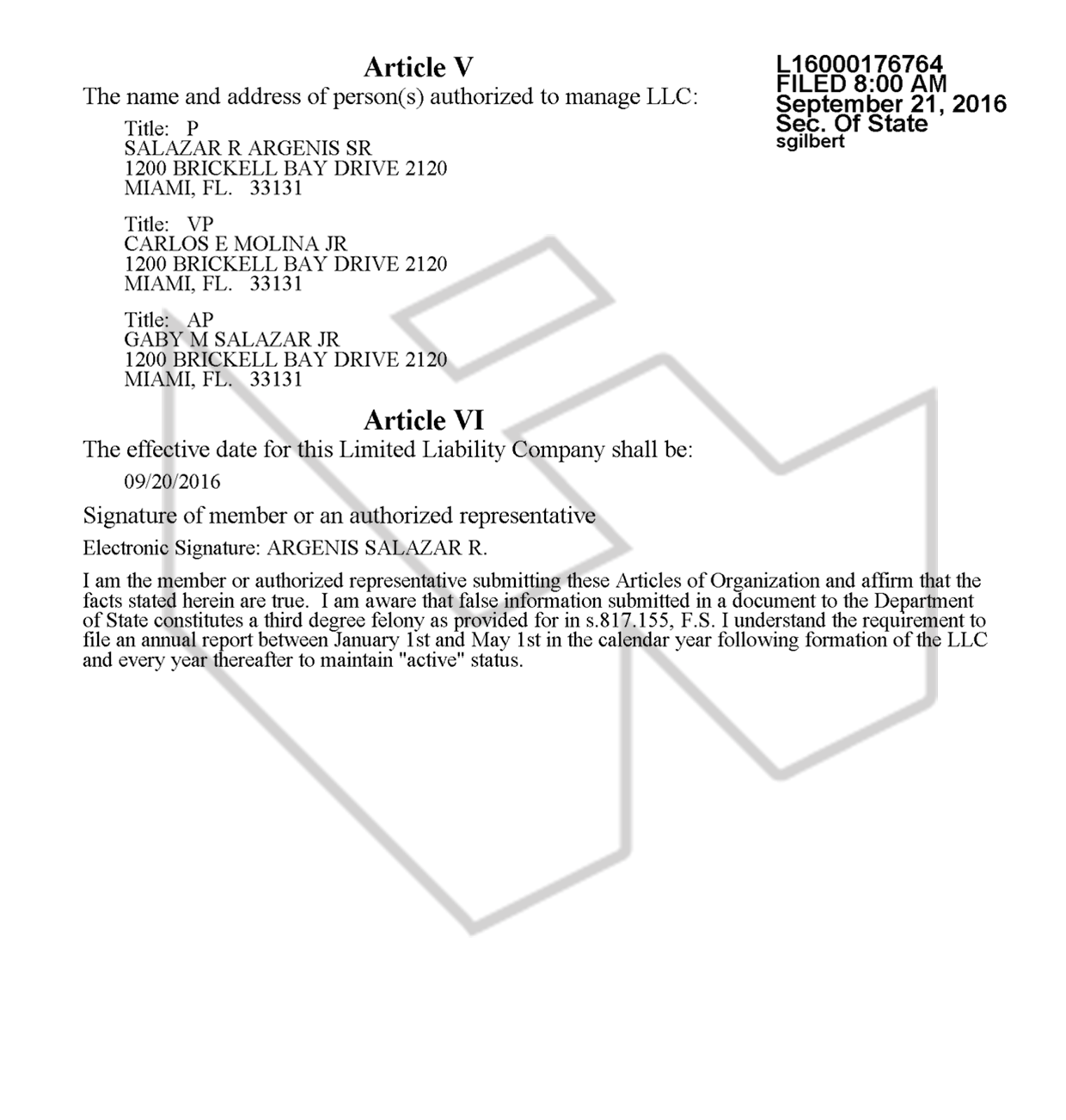
Velvet and Sonografica were able to be incorporated in Miami because the original Venezuelan companies, registered in that same city in the 80's, were not kept up to date and were inactive. Now these actions suppose a fight to verify which is the true recording label and which is the true owner of the catalogs.
Only Argenis Salazar has responded to the complaints of the representatives of the record companies and several singers, through emails. Salazar has reiterated that he owns the contracts that prove the ownership of the disputed titles, but that he cannot show them because they are confidential. When those affected insist, he promises that his daughter Gabriela, a lawyer, will show them the documentation. The first meeting has not yet taken place.
It is a response that Bettsimar Diaz, the legal representatives of Velvet and Sonografica, and even the authors and composers have received, who, without knowing the extent of this illegality, are claiming their copyrights.
This is the case of Pedro Castillo, remembered vocalist and composer of Aditus. In May of 2016, some friends told him with excitement that they had listened to a compilation of Aditus’ themes in Spotify. The new record was very good, they said. Strangely, Castillo asked them to see what it was and found an invented album, with a cover that did not exist among the Aditus’ albums, and even misspelled names of songs. The plate had been edited by Mundo Digital USA.
Something tragicomic happened to the singer-songwriter, Guillermo Carrasco. Some friends of his downloaded an incomplete album from iTunes and with songs different from those indicated. Once again, the copy belonged to Mundo Digital.
In the mails exchanged with the artists or their representatives, Argenis Salazar usually places the footer of the company Sono Ediciones de Venezuela. It is a company allegedly registered in Madrid, Spain, which he shares with Alvaro Veli. Luisa Flores, general manager of Sonografica, does not believe the name selection to be a coincidence because they are trying to emulate that of "Sono Editora", the Sonografica unit that handles copyright. "They made a mistake, they copied it wrong," she says.
From Sono Ediciones de Venezuela there is no documentation. No one answers the local number of the office in Madrid and the headquarters is located in an area of residential buildings, Plaza Los Mostrenses. Nor does it appear in the commercial registry offices of Spain.
And of their legal representative, Gabriela Salazar, they have sent information from the office in Venezuela that, like the whole plot, is impossible to verify. The supposed address is in Neveri Avenue, postal code 1250 in Caracas, but that code does not exist in Venezuela. The mentioned avenue is located in Colinas de Bello Monte, whose postal code is 1050. Also, the indicated building does not exist, the telephone number is not active and the Tax Registration Information (J-04042536-9) of the company is non-existent either.
Neither Veliz nor the Salazars, father and daughter, answered the requests for interviews sent since August. Their identities only seem to be in the bits of the "digital world" (“mundo digital”) where they operate.
In the case of the third partner of Mundo Digital USA, Carlos Eduardo Molina Gonzalez, aka Eddie Gonzalez (he introduces himself in both ways), his name is not foreign to the Venezuelan record industry. One of members of Los Fantasmas del Caribe, a Caribbean music group that sounded strongly in the 90’s was called that way.
Molina has dedicated himself to musical and audiovisual production and has registered at least four companies with the name of the group. In 2016 he faced a lawsuit as a representative of the entertainment company Just in Time, for breach of contract, fraud and defamation. Some people doubt that it is the same person, others neither confirm nor discard it.
What has been happening with these music catalogs, says Jose Rafael Fariñas, intellectual property lawyer and general director of the Society of Authors and Composers of Venezuela (Sacven by its acronym in Spanish), is a violation of the economic or patrimonial rights derived from the rights of author, which could also include the violation of moral rights by affecting the integrity of the work.
The key, according to the specialist, would be to determine who has the rights on the content that is being offered, which are usually generated in three ways: a contract (by agreement of the parties), provision of a law, or for mortis causa reasons (the owner dies and the heirs remain). If any of these three conditions is not present, it must be presumed that they are illicit products, he adds, although it may also be the case that the alleged contract that one of the parties claims to have, turns out to be a scam.
The Venezuelan Chamber of Phonographic Producers is aware of what happens with some of its members, and has even written to Mundo Digital USA. "We cannot do much because, in these cases, it corresponds to individual claims," clarifies Olga Tovar, director.
What they do warn, with concern, is that this misappropriation of music catalogs means an unexpected advance of piracy. Usually, pirates copy current trendy music, the new releases, the new hits and the great artists. With these principles the illicit market of pirate music was born and has lived on. "Until now they had not meddled with the catalogs, we kept them guarded because they are our livelihood. The fact that they have reached them, leaves us breathless", he says.
When Vice President Delcy Rodríguez turned to a group of Mexican friends and partners to lessen the new electricity emergency in Venezuela, she laid the foundation stone of a shortcut through which Chavismo and its commercial allies have dodged the sanctions imposed by Washington on PDVSA’s exports of crude oil. Since then, with Alex Saab, Joaquín Leal and Alessandro Bazzoni as key figures, the circuit has spread to some thirty countries to trade other Venezuelan commodities. This is part of the revelations of this joint investigative series between the newspaper El País and Armando.info, developed from a leak of thousands of documents.
Leaked documents on Libre Abordo and the rest of the shady network that Joaquín Leal managed from Mexico, with tentacles reaching 30 countries, ―aimed to trade PDVSA crude oil and other raw materials that the Caracas regime needed to place in international markets in spite of the sanctions― show that the businessman claimed to have the approval of the Mexican government and supplies from Segalmex, an official entity. Beyond this smoking gun, there is evidence that Leal had privileged access to the vice foreign minister for Latin America and the Caribbean, Maximiliano Reyes.
The business structure that Alex Saab had registered in Turkey—revealed in 2018 in an article by Armando.info—was merely a false start for his plans to export Venezuelan coal. Almost simultaneously, the Colombian merchant made contact with his Mexican counterpart, Joaquín Leal, to plot a network that would not only market crude oil from Venezuelan state oil company PDVSA, as part of a maneuver to bypass the sanctions imposed by Washington, but would also take charge of a scheme to export coal from the mines of Zulia, in western Venezuela. The dirty play allowed that thousands of tons, valued in millions of dollars, ended up in ports in Mexico and Central America.
As part of their business network based in Mexico, with one foot in Dubai, the two traders devised a way to replace the operation of the large international credit card franchises if they were to abandon the Venezuelan market because of Washington’s sanctions. The developed electronic payment system, “Paquete Alcance,” aimed to get hundreds of millions of dollars in remittances sent by expatriates and use them to finance purchases at CLAP stores.
Scions of different lineages of tycoons in Venezuela, Francisco D’Agostino and Eduardo Cisneros are non-blood relatives. They were also partners for a short time in Elemento Oil & Gas Ltd, a Malta-based company, over which the young Cisneros eventually took full ownership. Elemento was a protagonist in the secret network of Venezuelan crude oil marketing that Joaquín Leal activated from Mexico. However, when it came to imposing sanctions, Washington penalized D’Agostino only… Why?
Through a company registered in Mexico – Consorcio Panamericano de Exportación – with no known trajectory or experience, Joaquín Leal made a daring proposal to the Venezuelan Guyana Corporation to “reactivate” the aluminum industry, paralyzed after March 2019 blackout. The business proposed to pay the power supply of state-owned companies in exchange for payment-in-kind with the metal.